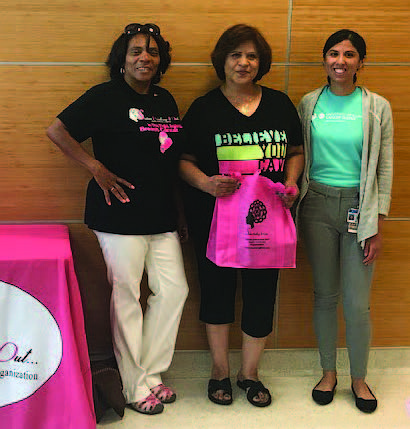Black Women Bonding Together to Provide Breast Cancer Support
Black Women Bonding Together to Provide Breast Cancer Support
While Black and white women may get breast cancer at the same rate, according to the U.S. Centers for Disease Control and Prevention, Black women die from breast cancer at a higher rate, and Beulah Brent said she wants to change that statistic.
Brent is CEO of Sisters Working It Out, a nonprofit in Matteson, whom Brent said provides breast cancer education and emotional, physical and financial support to women.
“In a nutshell, Sisters Working It Out (SWIO) is a women’s health organization that focuses on breast cancer,” explained Brent, who worked as a mammography manager at John H. Stroger Jr. Hospital of Cook County for more than 25 years. “Breast cancer is more or less a white women’s disease, but we [blacks] are the first to die from breast cancer.”
Brent’s assertion is supported by a recent report by the Metropolitan Chicago Breast Cancer Task Force, which said, “Black women were less likely to be diagnosed with breast cancer, but 62 percent more likely to die from it. At a time when several other racially diverse cities, such as New York and San Francisco, had low or non-existent breast cancer death rate disparities, Chicago’s breast cancer disparity was pronounced.”
The report, Breast Cancer Disparities: Improving Access To and Quality of Breast Health Services in Chicago, also pointed to another barrier for Black women having access to breast cancer screening.
“This data and Chicago’s legacy of segregation point to the impact that structural deficits in our healthcare system have had in creating systemic barriers to quality breast cancer screening and treatment, which disproportionately affect Black women. Biologically, breast cancer can be more aggressive in Black women compared to white women,” the reported stated.
And by many Black women not getting a mammogram at age 40, as recommended by health professionals, Brent said it is not detected at an early stage, and therefore could spread and cause death.
“If a woman has a mammogram appointment and needs transportation to get there, we provide that for her. And if we cannot take them, but a family member can, then we give her a $20 gift card to give to the family member,” said Brent, 60. “We work with the state, who has a program that will pay for mammogram tests, if you are uninsured or underinsured, considering the cost for a mammogram.”
However, not all healthcare providers participate in the reimbursement program, but the University of Illinois Hospital, Mercy and Mt. Sinai are all participants, according to Brent.
And even though October is Breast Cancer Awareness Month, Brent said women over 40-years-old should not wait until then to get a mammogram.
A mammogram is an x-ray of the breasts and without insurance could cost as much as $200, according to the CDC. Previously, before x-rays were invented, the only way breast cancer was detected was when breast lumps could be felt from the outside. At that point, it was often too late to treat a woman to prevent the cancer from spreading and causing death.
Besides costs, Brent said many Black women do not go get tested for breast cancer because they do not trust healthcare professionals especially older women over age 60.
Before the COVID-19 pandemic, the organization held monthly support meetings in Englewood at the University of Illinois Mile Square Health Center, 641 W. 63rd St., but now holds virtual meetings until the pandemic is over.
“Englewood, Auburn Gresham, Roseland, and Pullman on the South Side and Harvey and Matteson in the south suburbs, are areas where breast cancer diagnoses among women are high,” contends Brent. “And diabetes is another health disparity in the black community we are addressing.”
The organization handed out personal protective equipment, such as hand sanitizer, facemasks and gloves as well as breast cancer information in Robbins on June 27. From 12 to 2 pm. on July 2, SWIO will be in Harvey at the Christian Health Center, 31 W. 155th St. followed by another event on July 10 in Tinley Park and July 17 in Olympia Fields with assistance from State Rep. Debbie Meyers-Martin (D-38th), whose district includes Tinley Park and Olympia Fields.
“I met Bealuh and other members of her organization at the grand opening for my district office [in Matteson] and I told them then that I was extremely interested in women’s issues whether it was breast cancer or domestic violence,” recalled Meyers-Martin (38th). “And ever since that first meeting with them I have been volunteering for the organization.”
The SWIO was founded in 2001 by Dr. Monica Peak, a former primary care physician at Rush University Medical Center, who had researched health care disparities on Chicago’s West Side and realized how many Black women were not getting mammograms at an early age.
“We are a not-for-profit organization dedicated to helping women of color deal with their health issues and to make sure they get the care they need and deserve,” added Brent.
Latest Stories
- One Night Only Performance Show Dance Company Entering ‘New Horizons’
- New Choice Intervention Provides Much Needed Mental Health Services To The Community
- University of Chicago Program Brings Mavis Staples To Campus
- Larry’s Barber College Set For Expansion Of Facility And Education Programs
- Art Exhibit Shows And Tells The Stories Of Widows
- Introducing Shot Bar's New Location
- Illinois Reparations Coalition Advocates for Guaranteed Income Program as Drug War Reparations
- Reps. Kelly, Balderson Introduce Legislation to Combat Scams Targeting Seniors
- Gov. Pritzker Highlights Proposal to Eliminate $1 Billion in Medical Debt
- Customers urged to stay connected if they are behind on bills
Latest Podcast
Sydney Blaylock-The local skater with national experience

